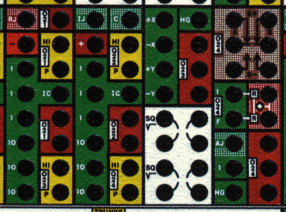
Patchbay for an old analog computer.
[Grades] [Compilers] [Links] [Syllabus]
[Examples] [Exams] [Reference]
|
|
Scientific Computing (P05 Spring,
2004)
[Grades] [Compilers] [Links] [Syllabus] [Examples] [Exams] [Reference] |
Compiler/IDE Options:
To write and test computer programs you need to combine a variety of software and hardware in what is sometimes called an "Integrated Development Environment" (IDE.) This can vary from...using a common text editor such as Edit on a UNIX platform or Notepad on a Windows operating system to create .txt files which you can compile and link with other software such as cygwin.exe or gcc.exe...to a more comprehensive all-in-one sort of package which is specifically designed to combine all these tasks under one umbrella.
IDE's you might want to use include:
The IDE that comes on the disk that is bundled with the text, How to Program in C++, by Deitel and Deitel is Microsoft® Visual® C++ 6.0 Introductory Edition. There are instructions on the disk for how to set this up.
Various resources are available at http://www.deitel.com/books/downloads.html including a tour of the book.
There are also instructions (you'll need the free acrobat reader to read these .pdf files) for
how to set up the UNIX emulating cygwin environment on a Windows operating system (Dive Into GNU C++ with CygWin on Windows)
how to author and compile simple console applications in the relatively complex environment of MS Visual C++ environment (Dive Into Microsoft Visual C++ .NET)
how to set up and use the Borland 5.5 free C++ compiler with an editor
There is yet another alternative environment for writing/compiling/linking/executing C++ code called DevCpp with is available for free download at http://www.bloodshed.net/devcpp.html. Go to the two links at the bottom of the page and follow either the Download from Sourceforge.net link or the Download from Simtel.net link.
While not as robust as the Visual C++ IDE's, DevCpp is attractive for several features:
it's small
it's free
it doesn't have a lot of features we'll never use in this class
the editor is nice and flexible
it's really easy to set up on most Windows platforms
Finally, a note of caution: many of these IDE's may want to be the default editor. It's possible to have several compilers and editors together on the same computer, but only one can be the "default."